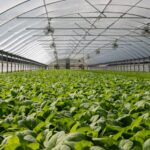
Immune Nutrition and Its Impact on Water Stress

Immune nutrition involves enhancing the plant’s immune capacity by stimulating it to increase the production of immune proteins. It also entails studying the essential nutrients required by the plant and their metabolic assimilation through their natural and automatic addition by humans to the soil. Good nutrition relies on a balance between the nutrients the plant needs, whether these nutrients are available in the soil or added as fertilizers. The closer the balance between these nutrients, in terms of quantity and quality, approaches the optimal level for the plant’s needs, the better the production, provided other necessary factors are available. When the quantity of one of these nutrients is deficient, its effect is evident on the plant, either through visible external symptoms or indirectly by affecting production. There are factors influencing the plant’s ability to absorb nutrients, and the amount of nutrients absorbed by the plant from the soil is affected by several factors, which can be divided into internal factors related to the plant itself and external factors related to the environmental conditions in which the plant grows, with particular emphasis on stress, especially water stress:
Firstly: Internal Factors
These include plant type, genetic structure , plant growth stage, root system characteristics, and also the vegetative growth in terms of growth and leaf area. There are also some physiological processes performed by the plant that affect absorption capacity, such as photosynthesis, respiration, and transpiration.
Secondly: External Factors
These include the type of nutrient, its concentration, and its availability for absorption. This is followed by the residual effect of fertilizers on product quality, which is explained below.
Effect of Fertilizers on Nutritional Value and Product Quality:
– Balanced crop nutrition clearly improves its external characteristics such as color, smell, flavor, and shelf life until sale. As for crop quality features in industrial use, they relate to protein and sugar aspects, which depend on the various nutrients absorbed by the plant (Tarasoil Potassium – krystafeed NPK ).
– Sufficient nitrogen increases total protein content and its quality, as well as certain vitamins. Excessive use of nitrogen increases amide content, which leads to an undesirable flavor when products are cooked, or raises nitrate content to unacceptable levels, especially for vegetables.
– Phosphorus fertilizers improve protein quality through the diversity of phosphorus sources and the focus on using compounds containing phosphite and phosphorus sources. This increases the plant’s water content, which in turn, when properly available, provides micronutrients and secondary elements, respectively. This is a type of stress resistance and helps the plant enter maturity. The figure illustrates the effects of phosphite on the plant (Tarasoil fosfotech Duo).
– Sufficient potassium increases carbohydrate formation and vitamins, and enhances firmness and texture, reducing spoilage during transport. High levels of potassium, however, can lead to a decrease in calcium and magnesium content, which may negatively affect product quality.
– Sufficient plant nutrients help build the plant’s tolerance to drought, frost, and cold, and resist the negative effects of ultraviolet rays on crops and the impact of water stress on the plant.
– Balanced crop nutrition clearly improves its external characteristics such as color, smell, flavor, and the product’s display period for sale.
Seaweed Extracts and Their Role in Enhancing Immunity and Water Stress:
Seaweed extracts are products used as an organic source due to their importance in stimulating plant growth at low concentrations, in addition to containing macro and micronutrients and growth-promoting substances such as cytokinins, auxins, gibberellins, vitamins, amino and organic acids, auxin-like compounds, and polysaccharides.
They act as an osmosis regulator at high concentrations, and the role of these extracts in increasing plant resistance to salinity and drought can be attributed to them. When these extracts are added to the soil, they improve its physical, chemical, and biological properties, increase its moisture retention capacity, and enhance microbial activity. Seaweed extracts affect plant growth and productivity depending on the type of extract or seaweed (Taravert Progress – Taravert Evo).
By: Eng. Mohamed Ibrahim
Technical Office Manager, Tarazona Egypt Co .






